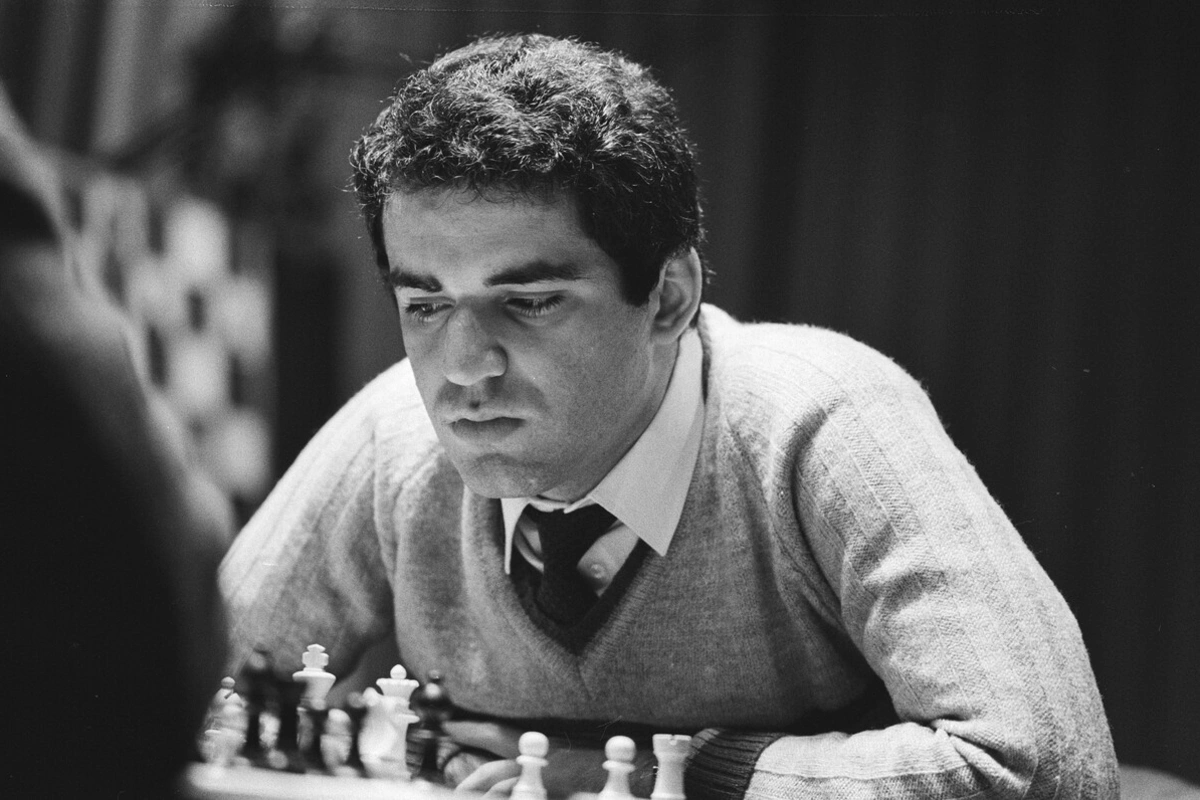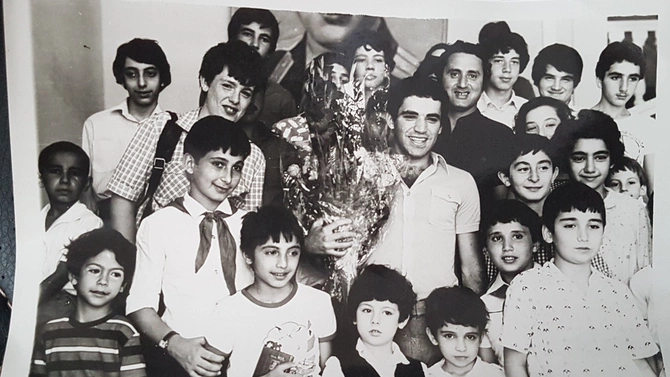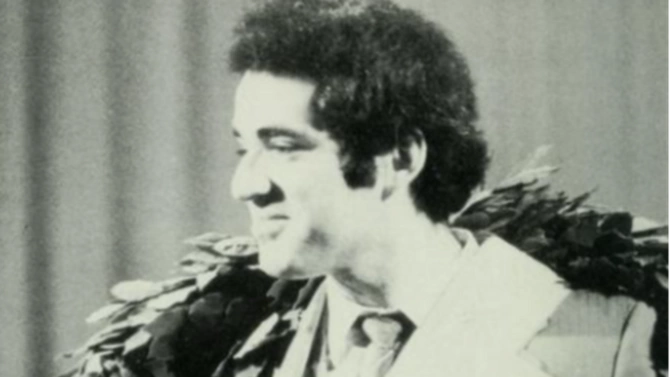
Chess legend Garry Kasparov, who later became a prominent opposition figure in Russian politics, spent his childhood and formative years in the multi-cultural melting-pot that was Soviet Baku. Recently, he has talked more about the assistance he received in his youth from both his devoted mother and the Azerbaijani authorities that provided key facilities he needed to focus on becoming world champion.
Image: Wikimedia Commons
Garry Kasparov is, for many, simply the best chess player the world has ever seen. Politically he has twice led Russian opposition political groupings and was briefly imprisoned for his anti-Putin stance. These days he is based in the US. Yet he was born in Baku, Azerbaijan. Typical of Soviet Bakuvians, his mother tongue was Russian, while his parents typified the ethnic melting pot that was a hallmark of the city. His father, Kim[1] Moiseyevich Weinstein, was a Jew of German descent who died when Garry was 7. His mother, Klara Shahenovna Gasparian/Kasparova, was the Armenian daughter of an oil engineer, and it was a Russified version of her surname that Garry took after Kim died. Garry’s grandmother Susanna Bagdasarovna was particularly proud of the family’s multiculturalism, telling him, “It’s wonderful that all my grandchildren are different nationalities” – variously self-defining as Azerbaijanis, Armenians or Jews.

In spring 1984, as an up-and-coming champion, Kasparov returned for a photo-op to the Pioneers’ Palace in Baku, where he had played as a child. Image: Wikimedia
Despite his father’s early death, Kasparov remained relatively privileged with well-connected relations. His paternal grandfather Moisey (Moses) was the operatic director of the Baku Philharmonic Society. His uncle Leonid, also a well-known composer of both opera and film music, married Bayaz Vazirova, the sister of Abdurrahman Vazirov (Əbdürrəhman Vəzirov) – who would eventually become the leader of Soviet Azerbaijan[2]. Yet it’s clear that this was also a family of relatively independent thinkers, especially if Kasparov is correct in asserting that his first name – a Russianized version of Harry – was chosen in honour of US President Harry Truman[3]. He claims that his father admired Truman’s “strong stand against communism” – which must have been awkward in the circles in which he moved.
In his book, Kasparov on Kasparov, Garry remembers Baku as “a typical outpost of the imperial [Soviet] state. A kind of large ‘Odesa on the Caspian’ – a melting pot of different nationalities.”
As a young boy, Kasparov remembers his parents solving chess puzzles in the Baku newspaper Vyshka and astounding them when he managed to solve one before he’d been formally taught the game. Rapidly this was corrected, and he started a very concentrated study of the game. His father had over-ruled the idea of sending him to music school as the rest of the extended family would have preferred.
From a very young age, Garry had an analytic mind, a remarkable, almost photographic memory and a passion for reading that he describes as “like some kind of spiritual greed.”
At school, he remembers that he felt “like a creature from another planet,” unable to connect with most other children. He admits that he was cheekily unguarded in showing up the teachers when they made mistakes, making him look rather arrogant. Sometimes he yearned for childhood normality and describes a time (presumably just around Novruz) when he indulged in some fire-jumping to show off to the girls. But his love of chess was already in overdrive.
The Soviet Union had a very strong support system of special chess education (something that continues in most post-USSR successor states). Garry soon found himself being coached at the Yuri Gagarin Young Pioneers Palace in Baku, which he perceived as a “fairy-tale castle of chess.” Kasparov’s autobiography estimates that the chess club there had trained more than 300 ‘first category players’ including Boris Sheynin, whose son Teimour Radjabov would go on to be the world’s youngest grandmaster in 2001.
On the day that they last met, Garry’s father gave him a chess clock, after which Kim left to Moscow for cancer treatment, never to return. Kasparov and his mother decided to pretend he was away on business. They moved to the quarter of Baku, then nicknamed ‘Armenikend,’ where the Armenian side of his family lived, and his mother essentially devoted the rest of her life to supporting Garry’s chess: he was already a rapidly rising chess star. In June 1972, though barely tall enough to reach the boards, 9-year-old Kasparov reached the finals of an adult blitz competition and was dubbed the “wunderkind from Baku” in the East German newspaper Neues Deutschland. He travelled to the Baltic republics in 1973 and, after a strong performance in Vilnius, was noticed by his future trainer and mentor, Alexander Nikitin, leading to his acceptance at the prestigious Botvinnik chess school. By 1976 he was travelling abroad, a rare accolade in Soviet days: he was reportedly the first of his class to travel abroad to a non-Communist country.
Then in 1979, what seems to have been a misunderstanding by the Soviet Chess Federation led 16-year-old Kasparov to participate in a full grandmaster tournament at Banja Luka (then Yugoslavia, now the Respublika Srpska, BiH): the federation had apparently believed that this was a junior tournament. By sweeping the board there, he was suddenly catapulted into the upper echelons of world chess.
Soon after, he remembers going with his mother to visit Heydar Aliyev, the then leader of Soviet Azerbaijan and (much later) president of the independent nation. Impressed with his Banja Luka performance, Aliyev arranged a new apartment for Kasparov and access to exclusive foreign-currency stores. Most significantly, he allowed Kasparov and his team to use a very exclusive government dacha complex at Zagulba (now a presidential palace). This gave Garry the luxury of space and peace of mind in which to concentrate as he developed his analysis of the game. As Kasparov noted recently, Aliyev “was not bothered that I was Armenian. What mattered was that I was from Baku,” adding that his “support would play a decisive role in preventing me from being ‘taken out of the race.’”
In this curious reference, he’s referring to a tussle within the power structures of the day. Kasparov’s meteoric rise was proving something of a threat to the carefully constructed Soviet chess institutions. As he mused in a recent interview, they “had no interest in replacing the Russian champion with a mixed-blood one from Baku.” The champion in question was Anatoly Karpov, who had been the world’s leading player since 1975, and with whom Kasparov would go on to have titanic chess battles in 1984, 1985 and 1986, the first lasting 48 games and taking 159 days - the longest championship contest series of all time. That was controversially stopped before either player proved himself victorious, but the nail-biting 1985 rematch saw Kasparov clinch the title.
It seems scarcely believable that, despite all the international attention and travel, Garry still managed to graduate in 1986 from his foreign languages course at the Azerbaijan Pedagogical Institute[4]. The same year he was also faced with another rematch with Anatoly Karpov. Kasparov’s interviews with Der Spiegel and other Western outlets had left him with the possible branding in Moscow of having ‘displayed anti-state behaviour.’ However, according to his autobiography, officials from the Azerbaijani chess federation stood up for him against the all-Soviet equivalent, helped also by Alexander Yakovlev, the ‘godfather of glasnost’ who had just been appointed head of propaganda at the central committee of the Communist Party in Moscow[5].
Though he had been considered the establishment figure, Karpov has since complained that Kasparov’s assistance from the Azerbaijani authorities had given his opponent much greater freedom to prepare. At the same time, he claims that Heydar Aliyev, by this stage a member of the all-powerful Soviet Politbureau in Moscow, exerted “extremely serious” pressure on Kasparov’s behalf.

1985 – world champion aged 22.
As the USSR fell apart, the Caucasus countries were riven with ethnic conflicts. Kasparov and his family fled Baku in January 1990 for Russia to avoid fierce anti-Armenian sentiment stoked by the brewing First Karabakh War. According to some reports, the grandmaster was helped to reach the airport by a powerful Baku clan well known as part of the so-called Mashtaga "flower mafia."
Despite the difficult personal circumstances, Kasparov

After Azerbaijan became independent, Garry essentially ‘became’ Russian while his country of birth made little attempt to celebrate his growing success. However, that has changed considerably of late, with interviews in which he recognizes the importance of the help he received from the Soviet Azerbaijani authorities. Meanwhile, Kasparov’s political career in Russia has seen him jailed and then (self)exiled. In 2014, Kasparov’s campaign to be elected President of FIDE (the world chess organization) was viewed as a Kremlin-backed proxy battle for world opinion.
And even now, the great battles between Kasparov and Karpov, so well-known in chess circles, have continued to play out symbolically in international politics. 70-year-old Karpov is now a pro-Putin deputy in the Russian duma (parliament) and was one of many public figures in Russia to be sanctioned by the EU over the Ukraine invasion. Meanwhile, US-based Kasparov remains a very vocal critic of the Kremlin. His 2015 book Winter is Coming was subtitled Why Vladimir Putin and the Enemies of the Free World Must be Stopped. And he has been very vocal in his criticism of the Ukraine war, for example Tweeting in the last week of March that “Russia will be a pariah until Putin is gone.”
[1] A name that was derived in politically correct Soviet fashion as an acronym celebrating the Kommunisticheskiy Internastional Molodyozhi (Communist Youth International)
[2] Vazirov died in January 2022
[3] In earlier versions, including his 1990 autobiography (p15), he gives a different story, and his first name at birth is generally recorded as Garik rather than Garry
[4] Some sources say he graduated from the
[5] p160
Share on social media